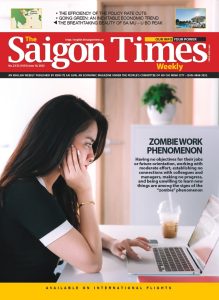Employees working perfunctorily, without making an effort to get out of their comfort zone, is a prevalent issue in human resource management. However, while the global average rate is only 8%, this figure is three or four times higher in Vietnamese businesses. Low job performance can have costly consequences for businesses and economies. The question is whether Vietnamese businesses are aware of this issue and have effective treatments in place.
When did “zombies” appear?
Until now, there is no documented evidence certifying when the concept of “work zombie” first emerged. However, according to Google search statistics, articles about work zombies started emerging in 2009. This was around the time when the world was reeling from the serious consequences of the global financial crisis that had taken place in the previous year. In 2010, the term “work zombie” was added to the Urban Dictionary.
According to a survey conducted by Aon Hewitt, a human resource and outsourcing company headquartered in the U.S., around 8% of people in their working age worldwide have experienced or are currently experiencing a state similar to being a “work zombie.” These individuals lose their interest in working, feel stuck, and lack motivation. Aon Hewitt considers them to be prisoners of their own jobs.
However, a Gallup Institute survey conducted in 2013 showed that up to 70% of employees in the U.S. had a loose connection with their company and were passively disengaged from their job.
A global survey by Aon Hewitt in 2016 indicated that 57% of businesses in Singapore have employees infected with the zombie virus or experiencing a state of inner resignation but are not leaving their jobs. Aon Hewitt also affirmed that “the number of zombies in large and medium-sized companies is double that of small ones.”
The American human resources company blames this situation on the tensions caused by large-scale projects in big companies. Failure to communicate smoothly and openly, due to complicated organizational structures and corporate culture, further exacerbates the issue.
In Vietnam, the work zombie phenomenon appeared in 2017, according to a headhunter company, and has since become widespread. Thanh Nguyen, Chief Executive Officer (CEO) of Anphabe recruiting firm, emphasized that “zombies contribute less to the company than normal employees, but they are still accepted due to lax management and insufficient welfare payments. This issue should be noted by Vietnamese businesses.”
The rising zombie phenomenon can be attributed to the Covid-19 pandemic, which has resulted in a period of remote working, psychological insecurity about salary and remuneration policies, and the aftershocks of losses and damages that labor has had to endure during the three years of the pandemic. The global economic volatility since the military conflict between Russia and Ukraine began on February 24, 2022 has further exacerbated the zombie situation among Vietnamese businesses.
Vaccines and suitable treatments for zombies
Lack of motivation to work is not just an individual story. It is a loss for businesses and comes at a high price for a country, as affirmed by Singaporean corporate development consultants.
In 2017, Peter Chang and Lily Cheng, co-founders of Pace Od Consulting, assumed that a low rate of interaction led to a higher frequency of employee absences from work, decreased revenue, lower customer satisfaction, and poor financial performance.
Research by Madison Performance indicates that “improving connections among employees could reduce the absence rate by 57% and increase customer satisfaction by 12%.” Aon Hewitt also found that a five-percentage-point increase in connections between employees correlates with a three-percentage-point increase in revenue the following year.
Two Singaporean therapists also stated, “Initiatives to build connections between employees need to prioritize creating opportunities and environments for employees to determine and make full use of their inner motivation. Organizations should focus on internal aspects, the status of each individual, and each situation to motivate their employees.”
That is the pre-pandemic story
After the Covid-19 crisis, employers have had to face global economic volatility and fluctuations. Inflation, concerns about economic slowdown, and a decrease in the quality and number of employees have become burdensome for businesses. Given these challenges, it is understandable that businesses may not prioritize employee welfare benefits.
However, according to a global welfare benefit survey conducted by Aon Hewitt in 2022-2023, businesses and organizations have strengthened their investments in employee welfare benefits.
What solutions are available for Vietnamese businesses?
There are no official statistics on Vietnamese businesses affected by the zombie virus or having zombie employees. While state-owned businesses appear to be unconcerned about the issue, and private companies pay less attention to it, foreign-invested enterprises strive to find solutions to the work zombie phenomenon.
A survey conducted on 30 client companies of a headhunter company shows that only 9% of local companies use consultancy services, and these are usually the larger ones, such as Viet Credit, FPT, HD Bank, PNJ, THP Group, Vietinbank, and Viettel. The rest are 100% foreign-invested companies or joint ventures.
What are the measures for zombie employees?
Psychologists share with The Saigon Times that everyone is sometimes distracted from work. Instead of implementing drastic measures for zombies, businesses should find ways to support them, searching for vaccines or medicine for treatment, as they have previously contributed to the company’s development.
 “On one hand, businesses need to stimulate their motivation to encourage them to make more efforts. On the other hand, businesses should adopt more effective management methods to measure employees’ work performance and remunerate them based on their achievements. By doing so, businesses can create a competitive and professional working environment,” said CEO Anphabe, Thanh Nguyen.
“On one hand, businesses need to stimulate their motivation to encourage them to make more efforts. On the other hand, businesses should adopt more effective management methods to measure employees’ work performance and remunerate them based on their achievements. By doing so, businesses can create a competitive and professional working environment,” said CEO Anphabe, Thanh Nguyen.
Psychologists and human resources managers also state that staying in a comfort zone for too long makes employees become lazy and lose the courage to make a breakthrough. Maintaining habits, fearing change, and worrying about self-capacity are reasons why employees lead a miserable existence in companies. This negative attitude can spread and have a detrimental impact on others, lowering the overall work productivity of the system.
Ph.D. Do Minh Cuong, deputy director of the Business Culture Institute in Hanoi, advises, “Businesses should help employees determine career objectives to avoid the influence of momentary feelings on work. If personal problems cannot be solved, employees’ depression at work will persist even if they change jobs.”
He also emphasizes the importance of work-life balance to revitalize the workplace, which is considered the duty of enterprises.
Nguyen Thi Hoang Anh, senior human resources manager of Carlsberg Vietnam, suggests two treatment methods. Firstly, a mental treatment method is applied through physical activities. Companies she has worked for have always strived to help employees live a healthy life through sports activities. According to them, a clear mind in a healthy body contributes better to organizations. Companies can organize classes on nutrition, teach employees how to eat healthily, or provide funding for gymnasium costs. Employees can also form groups for badminton, tennis, or football. Participation in such activities helps employees feel more connected to the workplace.
Secondly, companies can outsource a service company to measure the resilience of employees, helping them build spiritual strength, recognize their strengths, and give them the courage to confront personal hardships and move forward.









